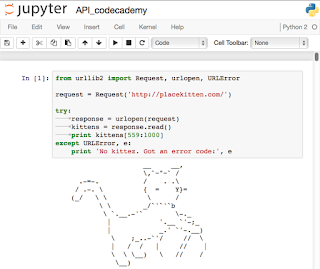JSON encoder and decoder
JSON (JavaScript Object Notation), specified by RFC 7159 (which obsoletes RFC 4627) and by ECMA-404, is a lightweight data interchange format inspired by JavaScript object literal syntax (although it is not a strict subset of JavaScript [1] ).
simplejson exposes an API familiar to users of the standard library
marshal and pickle modules. It is the externally maintained
version of the json library contained in Python 2.6, but maintains
compatibility with Python 2.5 and (currently) has
significant performance advantages, even without using the optional C
extension for speedups. simplejson is also supported on Python 3.3+.Development of simplejson happens on Github: http://github.com/simplejson/simplejson
Encoding basic Python object hierarchies:
>>> import simplejson as json
>>> json.dumps(['foo', {'bar': ('baz', None, 1.0, 2)}])
'["foo", {"bar": ["baz", null, 1.0, 2]}]'
>>> print(json.dumps("\"foo\bar"))
"\"foo\bar"
>>> print(json.dumps(u'\u1234'))
"\u1234"
>>> print(json.dumps('\\'))
"\\"
>>> print(json.dumps({"c": 0, "b": 0, "a": 0}, sort_keys=True))
{"a": 0, "b": 0, "c": 0}
>>> from simplejson.compat import StringIO
>>> io = StringIO()
>>> json.dump(['streaming API'], io)
>>> io.getvalue()
'["streaming API"]'
>>> import simplejson as json
>>> obj = [1,2,3,{'4': 5, '6': 7}]
>>> json.dumps(obj, separators=(',', ':'), sort_keys=True)
'[1,2,3,{"4":5,"6":7}]'
>>> import simplejson as json
>>> print(json.dumps({'4': 5, '6': 7}, sort_keys=True, indent=4 * ' '))
{
"4": 5,
"6": 7
}
>>> import simplejson as json
>>> obj = [u'foo', {u'bar': [u'baz', None, 1.0, 2]}]
>>> json.loads('["foo", {"bar":["baz", null, 1.0, 2]}]') == obj
True
>>> json.loads('"\\"foo\\bar"') == u'"foo\x08ar'
True
>>> from simplejson.compat import StringIO
>>> io = StringIO('["streaming API"]')
>>> json.load(io)[0] == 'streaming API'
True
>>> import simplejson as json
>>> from decimal import Decimal
>>> json.loads('1.1', use_decimal=True) == Decimal('1.1')
True
>>> json.dumps(Decimal('1.1'), use_decimal=True) == '1.1'
True
>>> import simplejson as json
>>> def as_complex(dct):
... if '__complex__' in dct:
... return complex(dct['real'], dct['imag'])
... return dct
...
>>> json.loads('{"__complex__": true, "real": 1, "imag": 2}',
... object_hook=as_complex)
(1+2j)
>>> import decimal
>>> json.loads('1.1', parse_float=decimal.Decimal) == decimal.Decimal('1.1')
True
>>> import simplejson as json
>>> def encode_complex(obj):
... if isinstance(obj, complex):
... return [obj.real, obj.imag]
... raise TypeError(repr(obj) + " is not JSON serializable")
...
>>> json.dumps(2 + 1j, default=encode_complex)
'[2.0, 1.0]'
>>> json.JSONEncoder(default=encode_complex).encode(2 + 1j)
'[2.0, 1.0]'
>>> ''.join(json.JSONEncoder(default=encode_complex).iterencode(2 + 1j))
'[2.0, 1.0]'
simplejson.tool from the shell to validate and pretty-print:$ echo '{"json":"obj"}' | python -m simplejson.tool
{
"json": "obj"
}
$ echo '{ 1.2:3.4}' | python -m simplejson.tool
Expecting property name enclosed in double quotes: line 1 column 3 (char 2)
.png)





0 comments :